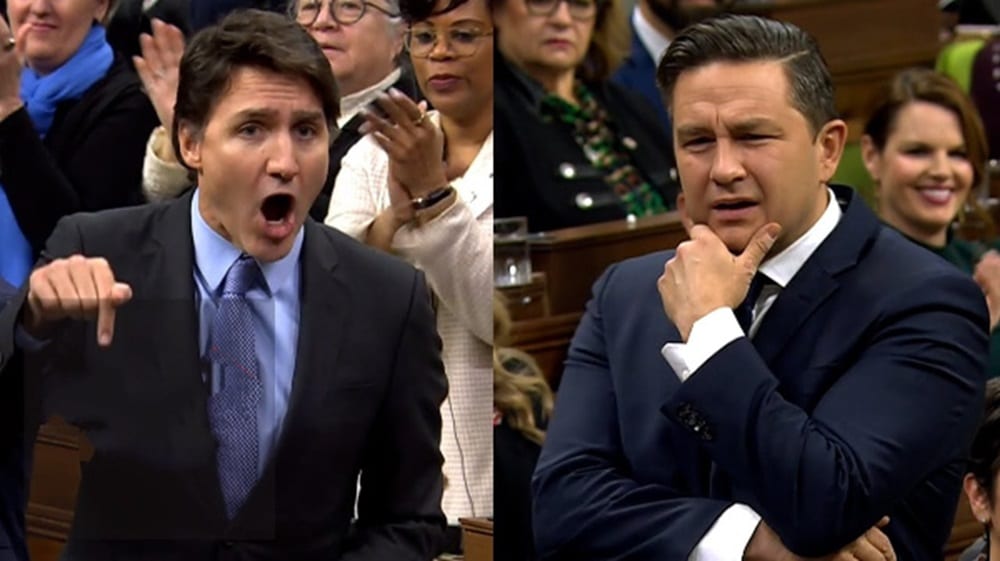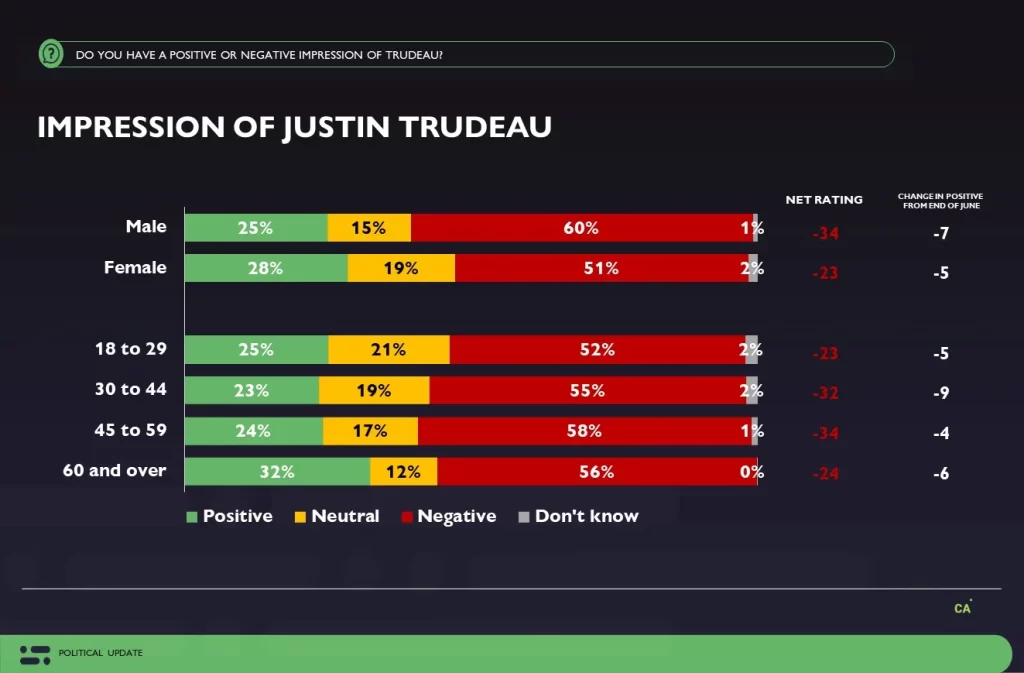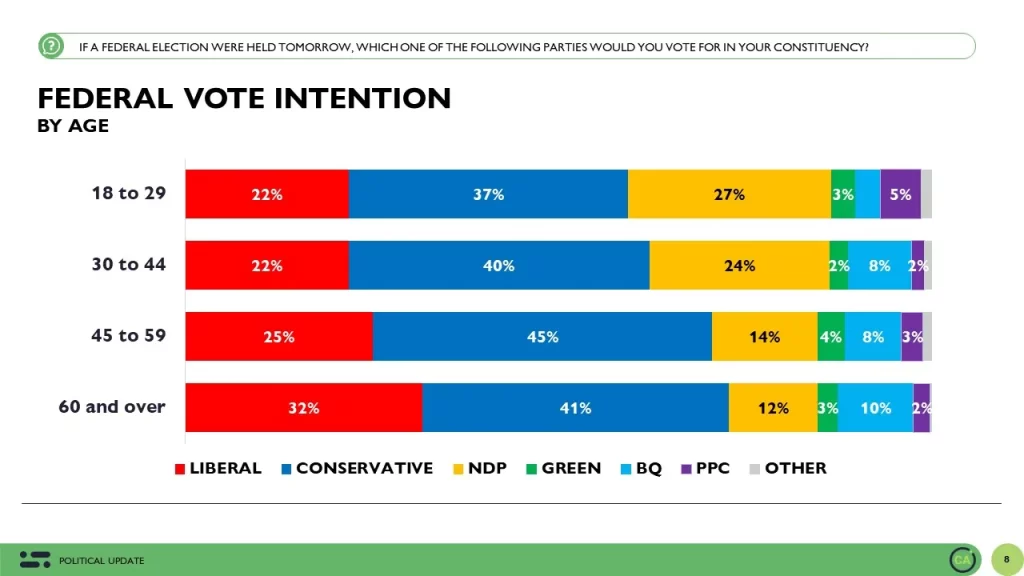Politics
Canada’s Conservative Leader Labels Justin Trudeau a “Wacko” Ejected from Parliament

Pierre Poilievre, the leader of Canada’s Conservative Party, was expelled from the House of Commons on Tuesday after calling Prime Minister Justin Trudeau “a wacko,” in the latest clash between two men who will face off in an election next year.
The official opposition Conservatives are way ahead in the polls. The incident began when opposition leader Pierre Poilievre criticized Trudeau’s alleged inability to crack down on drug overdoses.
“When will we put an end to this wacko policy by this wacko prime minister?” he questioned Trudeau in the House of Commons, the elected lower chamber.
Speaker Greg Fergus, a Liberal, warned Poilievre that his comment was unparliamentary and unacceptable, and urged him to retract it four times. Poilievre declined on each occasion, stating that he would instead use the terms extremist or radical.
Fergus warned Poilievre that he was rejecting the speaker’s authority and, in a rare action, declared, “I order you to withdraw from the House… for the remainder of this day’s sitting.”
Poilievre, who exited the chamber with his legislators, later reiterated his criticism of Trudeau’s drug policies.
“This is a wacko policy from a wacko PM that’s destroying lives,” he wrote on social media.
Justin Trudeau has a tense relationship with Poilievre, whom he erroneously accuses of being an extreme and supporter of former US President Donald Trump’s Make America Great Again campaign.
Trudeau had previously talked with mainstream reporters on Tuesday, accusing Mr. Poilievre of spending time with far-right groups.
“This isn’t responsible leadership. “That is dangerous for democracy and dangerous for Canadians,” he stated.
Ejections from Canada’s Parliament are uncommon. The speaker’s office did not immediately respond to questions about the last time a leader of the official opposition was kicked out.
Gen Z and Millennials Hate Justin Trudeau
The next Canadian election must take place by late October 2025. Public opinion polls show the Conservatives would win a big majority over the far-left Liberals, who have been in power since November 2015 courtesy to a coalition with the NDP.
According to polls, youth today dislike Trudeau more than ever before, and those who were born during the Trudeau administration despise it more than anybody else.
A series of Angus Reid Institute polls demonstrate that young people now despise the Trudeau government more than ever.
A Thursday poll asked Canadians under the age of 24 if Prime Minister Justin Trudeau was “working in the best interests of their generation.” Seventy-one percent said “no.”
To be fair to Trudeau, vast majorities of Canadians across generations did not regard him as working in their best interests — but the displeasure was greatest among those who came of age after the Liberals’ 2015 election victory.
Seniors, on the other hand, continued to be Trudeau’s most loyal supporters. Among respondents aged 65 and older, 69 percent disagreed with Trudeau’s government stance, while 28 percent considered the Liberals as representing their “best interests.”

Gen Z and Millennials are Turning Away from Trudeau
The corresponding figure among under-24s was 15%, the lowest of any other age cohort.
Under-24s were also the least inclined to consider Trudeau as the best candidate for prime minister. While a slender plurality preferred Conservative Pierre Poilievre in the PMO (25 percent over 23 percent for NDP Leader Jagmeet Singh), only 10% supported Trudeau.
“There appears to be much work to do for Trudeau to win over Gen Z and Millennial voters, even in the wake of a budget designed to address their concerns,” according to an Angus Reid Institute analysis of the figures.
The study was done after the Liberals introduced a federal budget titled “Fairness for Every Generation.” The word “fairness” appeared 50 times in the official budget paper, and all of its major initiatives — from affordable housing pledges to a rise in the capital gains tax — were framed as symbols of “generational fairness.”
“Taxing capital gains is not a party issue. In her budget statement on April 16, Finance Minister Chrystia Freeland stated, “It is an idea that everyone who cares about fairness should support.”
Thursday’s study on generational fairness adds to another Angus Reid poll issued this week, which found that Liberal support among under-24 voters has reached an all-time low.
According to a recent poll, only 12% of Canadians aged 18 to 34 favor the Liberal Party of Canada. That is not simply the lowest of any age category, but of practically any other voting component that Angus Reid pollsters could think of.
The only other voter group that was more anti-Trudeau than young voters was those who gave their address as Edmonton, Alta.; only 9% of Edmontonians planned to vote Liberal.

Gen Z and Millennials are Turning Away from Trudeau
Even Calgary ended up being slightly more liberal than the average Canadian in their early twenties. In the heart of the Conservative heartland, the Liberals polled one point higher, at 13%.
For more than a year, the Conservatives have enjoyed strong support among young Canadians. In September, an Abacus Data poll revealed the surprise result that Poilievre was more popular among Canadian youth than among Canadian seniors, a position nearly unique for a conservative leader.
In recent months, forecasts have shown the Tories on course for a supermajority in the next election, thanks mostly to under-34 voters defecting from the Liberals to the Conservatives.
However, new Angus Reid Institute data suggest that, after losing millions of followers, the Liberals are now losing voters to the NDP.
Under-34s were evenly divided between the NDP and the Liberals at the start of 2024 (a Jan. 22 survey placed them at 22% and 20%, respectively).
According to Wednesday’s Angus Reid poll, 36% of those under the age of 34 support the NDP, three times more than the Liberals’ 12%.
It’s why projections are increasingly pointing to the prospect that the Liberals may not only lose the next election, but that their defeat will be so severe that they will not even form the Official Opposition.
According to 338Canada’s most recent riding-by-riding forecasts, the Liberal caucus might collapse to as few as 51 seats.
With the NDP caucus forecast to have 33 seats and the Bloc Québécois at 45, it would only take five to ten flipped ridings in either Ontario or Quebec to push the Liberals to third-party status.







































